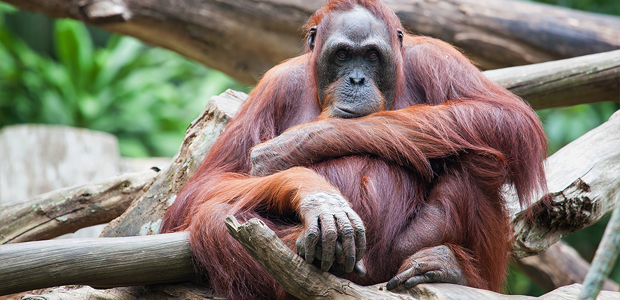Advertisement
Wildlife Wednesday: Sumatran Orangutan
While we know these gentle apes as orangutans, the native peoples of their homeland call them another, albeit similar, name—“orang hutan,” meaning “person of the forest.” And, with their mild gazes, dextrous limbs, and ability to think outside the box, it’s little wonder why. Habitat These orangutans can be found nestled in rainforests in the … Continued

While we know these gentle apes as orangutans, the native peoples of their homeland call them another, albeit similar, name—“orang hutan,” meaning “person of the forest.” And, with their mild gazes, dextrous limbs, and ability to think outside the box, it’s little wonder why.
Habitat
These orangutans can be found nestled in rainforests in the northern areas of the island of Sumatra, Indonesia.
Trivia
- Sumatran orangutans, like other great apes, are wicked smart. They’re practised in using sticks, rocks, and so forth as tools—a stick, for instance, works wonderfully for probing a termite mound for snacks, while leaves make great gloves when climbing something prickly.
- Since they’re so long lived (the oldest orangutan lived to be 58 years old!), a female’s offspring will often learn the tools of the trade from her.
- These resourceful redheads have plenty of unique traits. After all, orangutans are the only great apes to
- make their homes in Southeast Asia
- have a distinctive rusty hue to their fur
- be considered primarily arboreal, meaning that they spend almost all of their time in trees
- Because of their particularly strong affinity for foliage, they’ve developed a few adaptations that help them stay amongst the trees, including long arms and big hands and opposable big toes that let them hang upside down while searching for tasty fruit to eat.
Why are they threatened?
Partially because the orangutans have a slow reproductive cycle, with females not reaching maturity until about 10 years of age and only giving birth every six to 10 years, they’re unusually sensitive to habitat disturbances.
Meanwhile, the habitats that support these forest dwellers are being fragmented and lost due to legal and illegal logging, as well as conversion to agricultural developments such as palm oil plantations. One method to clear out forests is by setting certain areas on fire, which can get out of hand and affect vast areas of forest.
The orangutans are considered pests when they raid plantations at the edge of forests and can become the targets of illegal poaching and capture for trade.





